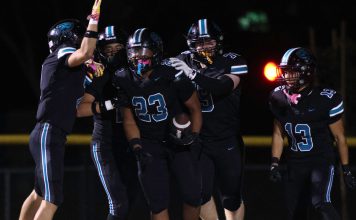Open government advocates can count a City Council decision to
ultimately release some draft reports as a small victory, but a
bigger battle still looms.
Open government advocates can count a City Council decision to ultimately release some draft reports as a small victory, but a bigger battle still looms.
Controversy has emerged recently over a private consulting company’s draft report concerning the future of the 9-1-1 call center and the efficiency of the police department’s deployment of officers.
In an unusual move, the council voted unanimously Oct. 15 to release all remaining draft reports along with the final version next month.
Top-level police officials and City Administrator Jay Baksa are the only people who have seen Matrix Consulting Group’s preliminary report.
The group is on its third draft and plans to present a final version to councilmen – none of whom has seen the report yet – Nov. 16, according to Assistant City Administrator Anna Jatczak, who added that the original first and second drafts are gone because they were written over for the third draft.
Transparency proponents say lost information like this and the consultation among Baksa, the police department and Matrix jeopardize the report’s initial candor and allow for over-zealous redaction.
But those on the other side of the aisle say the city’s contract with Matrix prevents it from “controlling the manner or determining the method of accomplishing the consultant’s services.” More basically, though, they argue that the city should not confuse residents with a deluge of error-prone draft reports.
“It gets a little murky for residents because there could be up to six drafts of anything,” Jatczak said earlier this month, “and residents might not understand the conversation that occurred between the consultant and [city] staff.”
Councilman Dion Bracco agreed and also said he preferred untainted expertise.
“I’m not qualified to run the police department,” Bracco said. “I need our upper staff there – the chief and his team – to tell us how we can make our police department better based on the recommendations received.”
Councilmen cautioned that the release next month of the third draft report, and any subsequent reports leading up the final version, is a one-time thing, though.
The majority of nearby cities only release completed reports, but the city of San Juan Capistrano has released draft reports before on a case-by-case basis, according to City Clerk Shawna Freels
This is a high-profile case for Gilroy, though, and Mayor Al Pinheiro said residents have misunderstood the council.
“The community has been told that this council is holding back on it,” Pinheiro said, so the council decision aims to disprove skeptics and show the community that “we’re not trying to hide anything. We’re just trying to get our jobs done.”
The status quo of withholding draft reports should not last for long, though, according to Terry Francke, counsel for Californians Aware, a nonprofit advocate for open government.
In a letter rejecting a request for the draft report under the state Public Records Act, Assistant City Attorney Jolie Houston cited a government code that exempts from disclosure preliminary drafts “that are not retained by the public agency in the ordinary course of business.” She also cited the city’s “deliberative process privilege.”
But Francke said Houston forgot that only opinionated recommendations – not facts – can remain sealed.
Any parts of the drafts that contain factual material (like numbers or statements) deserve continual exposure, but city officials who disagree with Francke say the undisclosed process of writing and re-writing drafts ensures that everything in the final draft is actually factual.
Either way, Francke said Houston’s logic remains suspect in light of Proposition 59.
Prop. 59 was a 2004 state ballot measure passed by 83 percent of voters that sought to limit a court decision more than a decade earlier.
In that 1991 decision, the state Supreme Court ruled that a newspaper’s request for then-Governor George Deukmejian’s schedule would, among other things, “inhibit the free and candid exchange of ideas necessary to the decision-making process.”
It was a case of the public’s interest in nondisclosure outweighing the public interest in disclosure – which Houston cited – since releasing the governor’s calendar could have hindered his ability to meet with people.
But Francke said the city’s reliance on this case is incorrect.
“The consultants are delivering their research and conclusions, and the staff are massaging this information to create the document they want to deliver to the council,” Francke wrote in an e-mail. “The consultants would not stop consulting, nor would the staff stop reacting, if their dialogue were made public.”
Furthermore, Francke wrote the council was not deliberating at all, but merely “standing by for delivery of the massaged final product like everyone else.”
So in effect, Francke said, the city is blurring excuses by citing the draft exemption and the deliberative process privilege.
The deliberative process privilege cited by Houston allows the city to prevent the release of “information that would chill the willingness of people to meet with public officials or discuss certain information,” according to Tom Newton, general counsel for the California Newspaper Publishers Association.
But no “chill” would ensue if the draft reports were released, Francke said, because governments can withhold only confidential information, like a police officer’s name or rank, but nothing factual that the officer might have said in a draft report.
“You can withhold an officer’s identity, but you don’t withhold what they say because it doesn’t make any sense to do an audit and expect it to have credibility and not disclose what was said,” said Francke, adding that Prop. 59 specifically did not grandfather in pro-secrecy exemptions like the deliberative process privilege.
In fact, the argument for Prop. 59 stated it would “allow the public to see and understand the deliberative process through which decisions are made.”
On top of this, the deliberative privilege has never been applied to paid professional consultants, Francke said, because communication between a consultant and city staff is different than dialogue between a constituent and a policy-decision maker, like in the case of former Gov. Deukmejian.
“It’s important to find out what a consultant learns throughout the process and what staff tells them to do,” Francke said.
It remains to be seen whether Francke’s logic will materialize into a lawsuit that challenges the city’s narrow interpretation of Prop. 59 when it comes to draft reports.
Before the council temporarily broadened its own interpretation, though, Councilman Roland Velasco warned his colleagues about the dangers of prematurity that can accompany transparency.
“I don’t want council members making opinions (on a draft report) and then popping off to the press about facts they don’t have yet,” Velasco said. “That’s a danger.”














